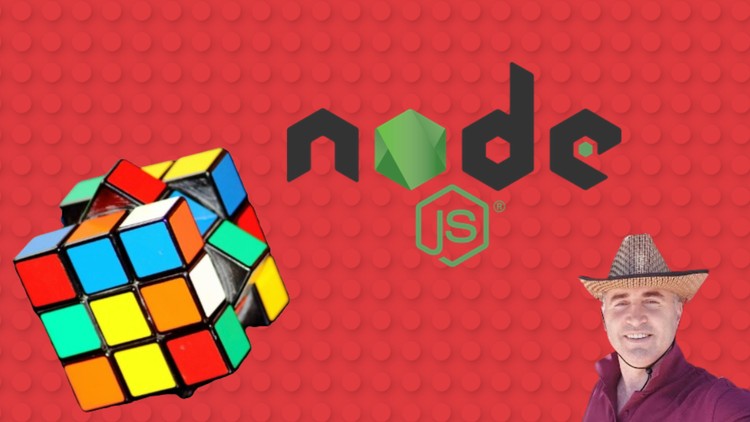
Your Step-by-Step Guide to Becoming a Node.js Expert
What you will learn
NodeJs Magic: Event-Driven Architecture
Create powerful apps using Nodejs essentials like HTTP servers, file systems, paths, and event emitters.
Master the Toolbox: Install, manage, and update packages effortlessly with npm.
Callbacks, Promises, and Beyond: Unlock the secrets of asynchronous programming with Nodejs.
Why take this course?
- Understanding Node.js Basics: Before diving into the advanced topics, it’s crucial to have a solid understanding of the basics of Node.js, including its event-driven architecture, asynchronous programming model, and the Node Package Manager (npm) for managing dependencies.
- Event Loop: Master the Node.js event loop and its non-blocking I/O model to effectively handle concurrent operations without threading.
- NPM & Yarn: Learn how to manage project dependencies with npm or Yarn, understand
package.jsonandpackage-lock.jsonoryarn.lock. - Core Modules: Utilize Node.js’s built-in modules like
fs,path,http, andcryptofor file system operations, path manipulations, HTTP server creation, and cryptographic functions respectively. - Express.js: Familiarize yourself with the Express.js framework, which simplifies the process of building web applications and APIs.
- RESTful API Design: Understand REST principles to design and implement well-structured RESTful services that are scalable, maintainable, and efficient.
- Middleware: Learn how to use middleware in Express.js to perform request handling logic and application-specific functionality.
- Real-time Applications: Explore the use of WebSockets with libraries like
socket.iofor building interactive, real-time applications such as chat services or live dashboards. - Security Best Practices: Implement security measures to protect your Node.js applications from common vulnerabilities, including SQL injection, cross-site scripting (XSS), and cross-site request forgery (CSRF).
- Testing: Write tests using frameworks like Mocha, Jest, or Jasmine to ensure your code is working as expected and to prevent regressions.
- Database Integration: Get comfortable with integrating Node.js with various databases such as MySQL, PostgreSQL, and MongoDB using appropriate libraries and ORMs like Sequelize for SQL databases or Mongoose for MongoDB.
- Migrations and Schema Management: Learn how to manage database schema changes over time using tools like Sequelize Migrate or Mongoose’s migration capabilities.
- API Documentation: Use tools like Swagger (OpenAPI) to document your APIs, making them easy to understand and consume by other developers.
- Deployment Strategies: Understand different deployment strategies, including containerization with Docker, process management with PM2 or Forever, and continuous integration/continuous deployment (CI/CD) pipelines.
- Performance Considerations: Profile your Node.js applications to identify bottlenecks and optimize performance through caching, clustering, or load balancing.
- Error Handling: Implement robust error handling in your applications to gracefully handle exceptions and provide meaningful responses to the client.
- Logging and Monitoring: Set up logging and monitoring for your Node.js applications to track performance metrics, log errors, and diagnose issues in production environments.
- Scalability and Load Testing: Understand how to design your application for scalability and perform load testing with tools like Artillery or k6 to ensure it can handle high traffic.
- Advanced Server Management: Learn about advanced server management techniques such as setting up SSL/TLS encryption, configuring reverse proxies with NGINX, and implementing rate limiting.
- Serverless Architectures: Explore the concept of serverless computing with AWS Lambda, Azure Functions, or Google Cloud Functions to build applications without managing servers.
- Microservices Architecture: Design a microservice-based architecture to break down your application into smaller, more manageable pieces that can be developed, deployed, and scaled independently.
- Inter-Service Communication: Understand the various methods of inter-service communication, including RESTful APIs, gRPC, messaging queues (like RabbitMQ or Apache Kafka), and event sourcing.
- Distributed Systems Design: Learn about the challenges and patterns involved in designing distributed systems that are reliable, scalable, and maintainable.
- Advanced Caching Strategies: Implement sophisticated caching mechanisms, such as Redis or Memcached, to improve application performance and reduce database load.
- Asynchronous Programming: Dive deeper into Node.js’s asynchronous capabilities, including promises (
Promiseandasync/await) and async iterators, to write more efficient and readable code.
By mastering these topics, you’ll be well-equipped to build, deploy, and maintain robust, scalable, and secure Node.js applications that meet the demands of modern web development.
English
language